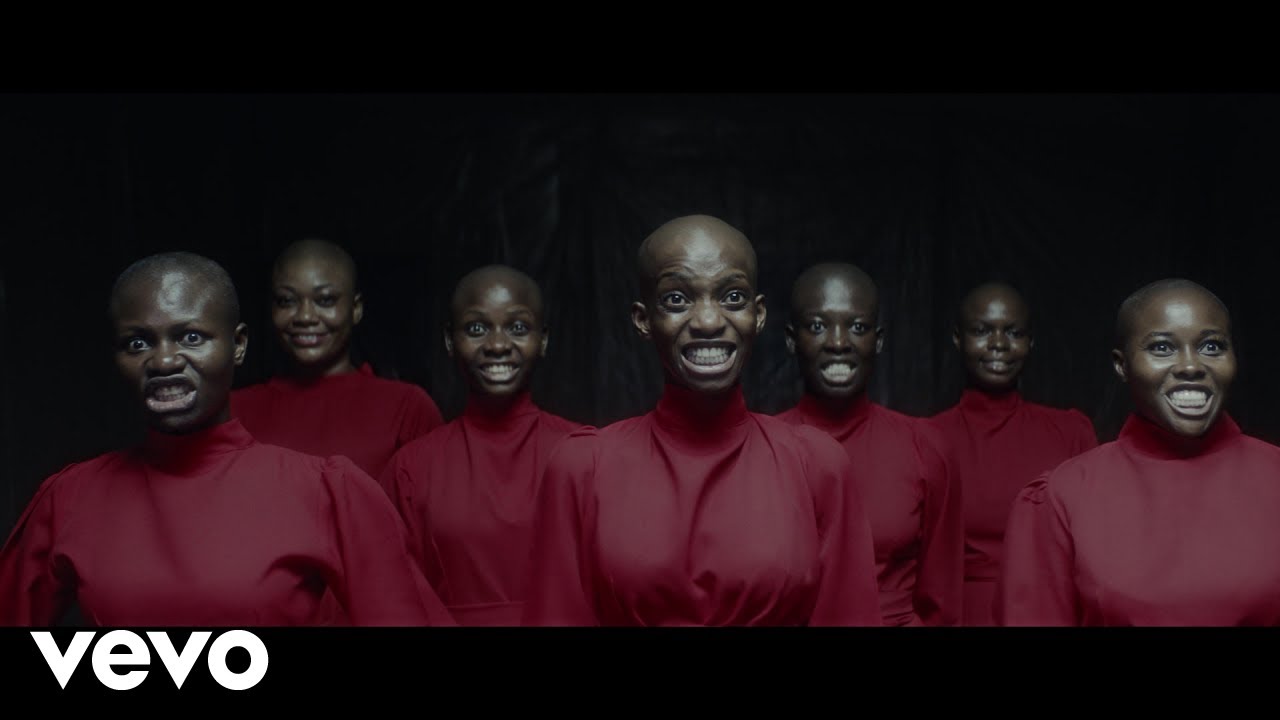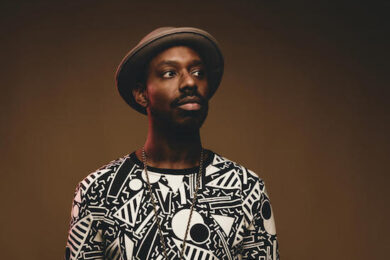Softly spoken and widely knowledgeable, Shabaka Hutchings is a generous interviewee. He eases into conversations the way that one might don their favourite jacket; a roll of the shoulders and straight down to business.
At just 36, the British-Barbadian saxophonist and bandleader’s influence on the contemporary UK jazz scene is matched only by his erudition off it. While there is significant weight behind each and every one of his words, anyone who has experienced his live performances will know that Hutchings’ is not music for the armchair intellectual. His instrumentation is brawny. Lung-busting sax lines are regular, and frankly masochistic, aspects of compositions that often sound as if he is trying to unfurl the combined heft of his worldly learnings through the bell of a tenor sax all at once.
Though those two things might seem at odds with one another, Hutchings is quite happy for them to co-exist. “We can do whatever we want as human beings,” he says. “Anyone can write their own story and it doesn’t have to be totally true in the way that truism is expressed in a society. There are certain people that we call artists for whom that realisation is acceptable. I think what we are trying to say is this can be possible for anyone”.
Quoting Angela Davis as readily as he does Sun Ra – Hutchings is regularly sketched as an elder statesman of a scene now relishing the throes of its own rambunctious adolescence. Throughout the last ten to fifteen years, he has jetted from scene to scene picking up a coterie of sparkling musicians along the way. Among his many projects, Sons Of Kemet (whose Mercury prize nominated Your Queen Is A Reptile was picked up by the legendary jazz imprint Impulse! ) features the formidable tuba of Theon Cross, while The Comet Is Coming (also Mercury nominated) is bolstered by the help of exceptional band mates Danalogue [Dan Leavers] and Betamax [Max Hallet].
Shabaka And The Ancestors, meanwhile, came about somewhat tangentially. The result of time spent in South Africa playing with various groups of musicians – Trumpeter Mandla Mlangeni’s Amandla Freedom Ensemble, introduced Hutchings to the Ancestors’ soon-to-be drummer and alto sax players. While encounters with South African band The Brother Moves On would bring him a singer and pianist.
The difference between his bands isn’t so much in the sonics or, for that matter, the scholastics: "Each of the projects is about the members. It’s not the case that any of the members could play any of the music. It is all about what the specific personalities bring to the music.” If his bands are distinct from one another because of their members then they are adjoined by their dedication to intensity. “The acceptance of intensity is within all good groups” and other than an obligatory pause to introduce the band, Hutchings mouth remains firmly fixed on the reed for the duration of his performances. “We more or less do full sets without talking and none of the groups stop between each tune. Even if the set comes back down or becomes more sensitive, there needs to be intensity in every type of emotion and we need to keep at the forefront of the music.”
Considering the success he consistently achieves with each of his bands it is hard not to draw parallels between them. “At a certain point in their career, a lot of musicians stay in one area of music. Either that or they get a pop gig and disappear for a few years.” For Hutchings, however, the drive to create seems to be so strong that he creates groups seemingly by accident. By his own admission, Shabaka And The Ancestors was never meant to be a touring band. Rather it was to be a platform that would weave together the relationships he had built with musicians in South Africa to “play some music”. Now, after the recent release of their widely lauded second album We Are Sent Here By History, The Ancestors are quietly emerging as the tellers of some of the most engrossing stories in Hutchings’ veritable pantheon of fables, despite having never been intended as a band proper.
“There are different ideas of what the term ancestor means” he explains “especially when you start spending time in Africa where there is actual ancestor worship. The idea of ancestor worship is that time is a circular continuum.” Hutchings and his band are very much ancestors in the present tense – physically at least – but their music absolutely finds its divination in zones of liminality. A literal reading of their most recent work might suggest that his band have been compelled by events of the past to make the album. Hutchings, however, is keen to clarify that as the writers of their own histories, The Ancestors project is equally as dedicated to the imaginaries of the future as it is to reflections on the past. “It’s that play between what has happened and what will happen – the present being the pendulum swinging in between.”
Cutting through atemporal space, the music bears its own crucial missive on the listener. “I always liked the idea that the world would end” – the monumental words delivered in a curious sort of deadpan coo – and whatever that end might be, Hutchings is honing in on it in his own delineated way. We Are Sent Here By History was conceptualised as a sonic poem that would tell the story of the end of the world as we currently perceive it. Through the album we are led to behold the deceiver. “You behold the things that have been masking the truth; the idea of civilisation and the idea of enlightenment.” And in moving forward, he is quite clear that the world we build “has to be linked to the idea of deconstructing masculinity. Deconstructing what it means to be a man masked.”
On the rare occasions that Shabaka Hutchings leaves a question unanswered, he will almost always cross your palm with the juicy implication that it is because he intends it to be that way. He is not one to be cowed and when pressed on the narrative of the end time, he prefers to leave space for the listener to make their own appraisals: “My hope isn’t that people understand the narrative as I think about it. My hope is that in reading it, people find different things through it. You might meet each poem and while having that hour long space to consider, you might think about a completely different narrative than I have intended and for me that’s the power of music that lies beyond the performer.”
An obsessive documenter, he admits to having pretty much every gig he has played in London over the last decade stored up on a hard drive at home. He’s been logging his career mostly for pleasure, but as often seems to be the case with Hutchings, there are imperatives that run deeper and as an artist he is almost always forthcoming. “It is for history, as an abstract concept, because history is what’s documented.” The systematic chronicling of his work is a tacit admission of having prepared foundations for what comes next personally, even if he would rather that we prepare our own. It is a simple act with far reaching consequences, it is the cornerstone on which worlds worth dreaming of are built.
During talk of Sun Ra – whose words Hutchings rattles off with the kind of offhand confidence one only develops through intimate knowledge – and Octavia Butler, he sheds light on the afro-futurist themes that run through his work. It is his understanding that the world is at an undeniable point of crisis. “We have pushed the earth to the point that to suggest that as a species we’re not coming to extinction is a falsity.” The solution, he believes, is to seriously “explore the possibilities of appraising a collective reality as opposed to saying we need to drift towards one dominant one.” Made possible through the appreciation of history – both as concept and as experience – each individual’s history informs a different way of seeing the world.
“The alternative is terrible. The alternative is basically having nothing. Especially being a person of colour. Being a person from a diasporic community. Being a person coming from a history that has been told is irredeemable. I think the only way forward is to start imagining. There has been imagination that says black people are not worth anything. You know, patriarchy and white supremacy are both imaginative structures; the supposed capability of the rich white person is an imaginative structure. So, what we need to do is start imagining. The more imagining you do, and the more imaginative structures that you build – from a pan Africanist background – the more that those structures can start feeding into reality. For me, that’s one of the ways the world functions. The people with the biggest imaginations fulfil that imaginative role in reality.”
We Are Sent From The Future should also be understood through that lens. Song after song, it lays down a mythological superstructure with which anyone can identify and within which people can find their own agencies. Each chapter of its vertiginous narrative is hewn into rough, ready, and crucially real chunks, quite literally with the instruments at their disposal. It is Hutchings hope that the album can act as part of the “stimuli that encourages you to think about your past” and as such, your future. Far from naive, Hutchings does not shy from realities that do not require any cosmic leaps of the imagination. “There is the reality of how do I pay my rent? how do I put food on the table?”
Until very recently, that was the sole domain of the trap of capitalism. The same one that requires we always think in singular terms of survival. The outlook at this current time seems particularly bleak and perilously close. Yet, mired as we are in the grips of a new, and alien reality, Hutchings’ words ring truer than ever. “Considering all this, what do you teach your kids? How do you relate to your neighbours? How do you try to structure the world as you see it right now?”
In case it wasn’t already clear, the end that Shabaka Hutchings has been thinking about is nigh. He feels that the reaction to that sentiment “should not be one of pessimism.” Sun Ra famously said “If we came from nowhere here, why can’t we go somewhere there?” Right here, right now, Hutchings can not and will not provide answers that he does not have. Perhaps though, in his music, he can offer a simple suggestion. “I think it is good to think deeply about those ways of thinking about the past and present and where you sit within relation to what has happened before. Once you’ve internalised that way of seeing the world, everything you do becomes a manifestation of that.”




